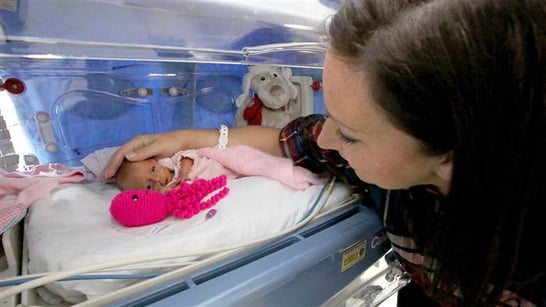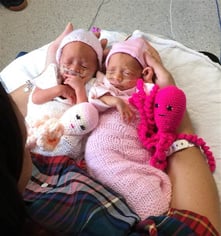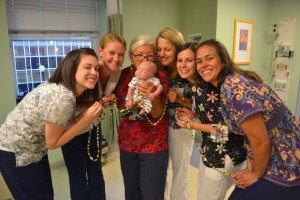 Do you or someone you know, love to knit or crochet? Perhaps you’d be interested in putting those skills to work for a terrific cause.
Do you or someone you know, love to knit or crochet? Perhaps you’d be interested in putting those skills to work for a terrific cause. One hospital in Dorset, England has stumbled upon an unusual way of making tiny premature babies in the neonatal intensive care unit (NICU) feel safe and comforted: by giving them a tiny handmade octopus to curl up with.

According to Poole Hospital, where the practice of pairing preemies with crocheted cephalopods has become an ongoing ritual, these cuddly crafts do more than just calm the babies.
The idea originally hails from Denmark where Aarhus University Hospital has suggested that the creatures can actually help smaller babies grow and thrive. A spokesperson for Poole hospital stated that the decision to introduce the crocheted crafts to patients wasn’t based on published scientific research but contact with other hospitals who had found they made a noticeable difference to their little patients.
But it can't be just any toy. It must be an octopus.
So why these sea creatures exactly? The design of the crocheted tentacles gives the babies something to hold and squeeze, and that can be a good thing for regulating everything from oxygen intake to heartbeats. What's more, the tentacles might be helpful at keeping the tiny patients from pulling out their tubes.
A number of babies at Poole Hospital took to their new toys especially well. In a feature that in the Daily Echo last fall, it was revealed that premature twin sisters Jasmine and Amber Smith-Leach both benefited from the comfort of their new toys. Their neonatal nurses said they have no doubt these tiny octopuses have helped the girls.
What's more, in response to the story, the hospital's NICU has received a whole new supply of crocheted octopuses for future patients.
“We’ve been overwhelmed by the kind response to our appeal for crochet octopi,” said Daniel Lockyer, matron of neonatal services. “We’ve now received over 200 octopi and have a year’s supply ready and waiting for our little patients! We’re not looking for anymore octopi for a little while so we can use these up.”
“We’ve been overwhelmed by the kind response to our appeal for crochet octopi,” said Daniel Lockyer, matron of neonatal services. “We’ve now received over 200 octopi and have a year’s supply ready and waiting for our little patients! We’re not looking for anymore octopi for a little while so we can use these up.”




